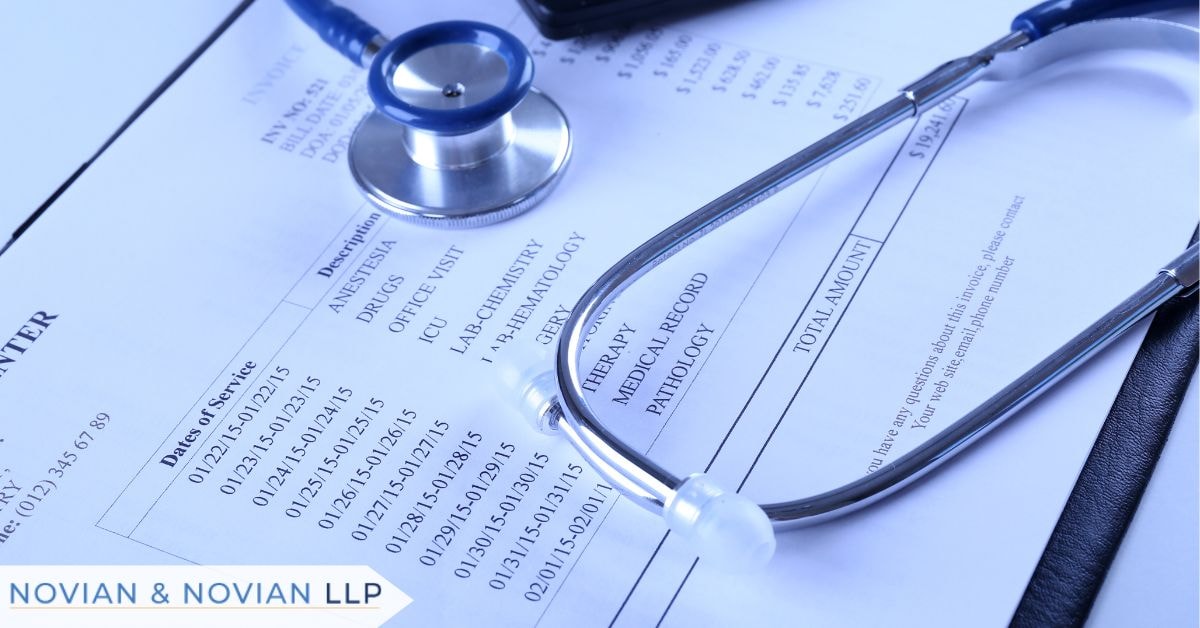A personal injury settlement is intended to compensate the injured party for both economic and non-economic losses resulting from an accident or injury. These often include medical expenses, lost wages, pain and suffering, emotional distress, and other related costs. Among these, medical bills are typically one of the largest and most urgent concerns.
While a personal injury settlement usually includes compensation for medical bills, it doesn’t always cover them in full. This can happen if the settlement was negotiated without accounting for future or outstanding medical expenses, or if some treatments weren’t completed or documented at the time of settlement, among other potential factors like insurance subrogation claims or unexpected complications in recovery.
To ensure your settlement includes all medical expenses, and that you’re not left with unexpected bills, you need to work with a qualified attorney who can advocate for your full financial recovery. At Novian & Novian, we have over 35 years of experience specializing in personal injury and catastrophic injury cases in California. Schedule a free consultation with us today to help you understand your legal options!
This post will explain how settlements are calculated and how medical bills are handled in settlements. It will also let you know the factors that affect how much of your medical costs are paid.
What Is a Personal Injury Settlement?

A personal injury settlement is a financial agreement reached between an injured person (the plaintiff) and the party responsible for causing the injury (typically through an insurance company) to resolve a legal claim without going to trial. This settlement compensates the injured party for the harm and losses they’ve suffered due to someone else’s negligence, carelessness, or intentional actions. It is a legally binding agreement that, once accepted, usually prevents the injured person from seeking further compensation for the same incident in the future.
In a typical personal injury case, the process begins when an individual is harmed as a result of another party’s negligence, such as in a car accident, slip and fall, or workplace injury. The injured party must prove that the other person was legally liable, meaning they had a duty of care that they failed to uphold, and that this failure directly caused the injury.
While there is no fixed amount for every case, the average personal injury settlement ranges from a few thousand dollars to well over $75,000. Personal injury settlements are calculated based on the extent of these damages, which fall into two main categories: economic and non-economic damages.
Economic damages refer to tangible, out-of-pocket expenses like medical bills, lost wages, future medical treatment, and property damage. These are relatively straightforward to quantify using documentation and receipts. Non-economic damages, on the other hand, are more subjective and include pain and suffering, emotional distress, loss of enjoyment of life, and in some cases, loss of consortium. These damages aim to compensate for the more personal and less measurable impacts of the injury.
Are Medical Bills Included in a Personal Injury Settlement?

Yes, medical bills are typically included in a personal injury settlement as part of the economic damages awarded to the injured party. These damages are intended to compensate for both past and anticipated future medical expenses resulting from the injury caused by another party’s negligence.
Medical bills refer to the full range of costs associated with necessary medical attention, including emergency room visits, hospital stays, surgeries, diagnostic tests, physical therapy, rehabilitation, prescription medications, and follow-up appointments. Since medical costs are often the most substantial part of a personal injury claim, especially when the injury leads to long-term or ongoing treatment, it is essential for injured individuals to maintain detailed records of every medical expense.
Paid medical bills may include those covered by the injured party’s health insurance or paid out-of-pocket, while future medical expenses account for ongoing care such as physical therapy, follow-up treatments, or surgeries that have yet to occur.
In many personal injury cases, insurance companies, whether health insurance, auto insurance with PIP coverage, or liability insurance, may have already paid some of the medical bills paid upfront. Understanding how these payments affect the settlement and how health insurance and auto policies interact with a personal injury claim is essential.
It is also important to keep in mind that there are some situations when medical bills may not be included as part of personal injury settlements. These situations include:
- The settlement amount was negotiated without factoring in all future or outstanding medical expenses.
- There are medical liens or insurance subrogation claims that must be repaid out of the settlement.
- The at-fault party’s insurance policy has coverage limits that don’t fully meet your medical costs.
How Medical Bills Are Handled in Settlements
In a personal injury settlement, reimbursement for medical bills that have already been paid is a compulsory part of the settlement amount. When health insurance companies, Medicaid, or even medical providers have covered or deferred payment for treatment, they often have subrogation rights. This means they are legally entitled to be reimbursed from the settlement funds once the case is resolved.
Medical liens may also be placed by medical providers who agree to treat the injured party in exchange for payment out of the settlement. These liens must be resolved before the injured person receives the remaining funds. A personal injury attorney plays a key role in negotiating with lienholders and insurance companies to potentially reduce the amounts owed, helping the injured party keep more money from the settlement.
Future medical expenses are also a vital part of many personal injury settlements, especially when the injuries involve ongoing care or permanent conditions. Estimating these future costs requires careful documentation of the treatment plan, expert medical opinions, and a strong understanding of how the injuries will impact the injured party over time.
Experienced personal injury attorneys work to ensure that all future medical expenses are accounted for and that the settlement reflects the full scope of necessary care. Without adequate documentation and legal guidance, the injured party risks accepting a settlement that fails to cover their future needs, leaving them to pay outstanding medical bills out of pocket later.
The bottom line is that a personal injury settlement generally includes medical expenses related to the injury, both past and future. However, navigating the complexities of insurance coverage, medical liens, and reimbursement obligations can be overwhelming. Working with an experienced personal injury lawyer is essential for seeking fair compensation and achieving a favorable outcome. An attorney will help protect your rights, deal with debt collectors and lienholders, and ensure that the legal claim reflects the full extent of harm caused.
How Settlement Amounts Are Calculated

When you file a personal injury claim, one of the central questions is how much compensation you’re entitled to receive, especially when it comes to covering medical bills and related damages. Settlement amounts are calculated based on several components, including actual economic losses and non-economic damages such as pain and suffering.
One of the most crucial steps in this process is the documentation of all medical expenses. This includes hospital bills, doctor visits, prescriptions, physical therapy, diagnostic tests, and any other treatments related to your injury. Without clear and complete documentation, insurance companies may challenge the necessity or cost of certain treatments, potentially reducing the settlement amount.
Personal injury attorneys play a vital role in estimating not just your past medical expenses but also your future medical costs. If your injury is ongoing or permanent, an attorney will work with medical experts to assess your long-term care needs. These evaluations can include future surgeries, rehabilitation, medication, in-home care, or assistive devices, all of which should be factored into the settlement. By providing a well-supported estimate of future costs, your legal team ensures that your compensation adequately reflects both current and anticipated medical needs.
Another common method used to calculate settlement amounts is the multiplier method. This technique involves taking your total medical expenses and multiplying that amount by a number, typically between 1.5 and 5, based on the severity of your injuries.
For example, if you suffered a spinal injury in a car accident that required surgery and months of physical therapy, a multiplier of 4 or 5 might be applied to your total medical expenses. This resulting figure helps calculate the compensation for pain and suffering, which is then added to your overall damages. The multiplier method offers a structured way to assess the non-economic impact of an injury and is commonly used by insurance adjusters and personal injury attorneys during settlement negotiations.
If you’re curious to calculate your own settlement, try our calculator:
Personal Injury Calculator

Factors That Affect Medical Bill Compensation
Several key factors influence how much of your medical bills will be compensated through a settlement. First and foremost is the severity of your injuries. Generally, more serious injuries result in higher medical bills and more substantial compensation. For instance, a traumatic brain injury or spinal cord damage typically requires extensive treatment and ongoing care, which will significantly raise the value of a claim compared to a minor sprain or soft tissue injury.
The type of treatment needed also plays a role. If your recovery requires surgery, hospitalization, or specialized care such as neurology or orthopedic treatment, those costs will be reflected in your claim. Likewise, injuries that require long-term physical therapy or home modifications due to disability will increase the overall value of your settlement.
Another important factor is the duration of your recovery. Longer recovery times often mean more medical appointments, extended time off work, and a greater impact on your daily life. This extended hardship not only raises your medical costs but can also increase your compensation for lost wages and pain and suffering.
Whether the injured party is expected to require lifelong care is especially important in cases involving permanent disabilities. If you are no longer able to return to work or require long-term assistance, your lawyer will work with experts to estimate these future costs and advocate for their inclusion in the final settlement.
Medical liens also influence how much of your settlement you ultimately take home. A lien is a legal claim by a medical provider or health insurance company for reimbursement of medical expenses paid on your behalf. While these liens must be resolved before you receive the remainder of your settlement, a skilled personal injury attorney can negotiate reductions in the lien amounts, which helps preserve more of the compensation for you.
How to Maximize Your Settlement for Medical Bills

Hiring a skilled personal injury attorney can make a significant difference in the outcome of your settlement. Yes, having legal representation is well worth it, especially when facing complex claims involving serious injuries and extensive medical bills. An attorney helps assess the full scope of your damages, not just the visible medical bills, but also future treatment needs, lost wages, pain and suffering, and other related losses. By accurately valuing both economic and non-economic damages, your lawyer can build a compelling case that reflects the true impact of your injuries.
Generally, insurance companies are known to offer low settlements in hopes that the injured party will accept a quick payout. A personal injury lawyer understands these tactics and is equipped to negotiate for a fair settlement that reflects the actual harm caused.
Your attorney can also deal with insurance adjusters and use expert witnesses such as doctors or financial consultants to demonstrate the value of ongoing care or reduced earning capacity due to your injuries. In cases where insurance companies refuse to offer a reasonable amount, your lawyer can escalate the case by filing a personal injury lawsuit, ensuring that you continue to pursue compensation through the court system if necessary.
One of the most overlooked challenges in personal injury settlements is the issue of subrogation and medical liens. If your health insurance paid for your treatment, they may claim reimbursement from your settlement. Similarly, hospitals or doctors who provided care without upfront payment may place a lien on your settlement. A personal injury lawyer can navigate these complex financial obligations, negotiate lien reductions, and work to protect your final recovery amount.
Reducing these liens can significantly increase the money you take home from the settlement. An experienced attorney will also ensure that future medical expenses are adequately factored into the settlement, especially if your injury requires long-term care or additional procedures.
Another essential step in maximizing your settlement is maintaining complete and organized medical records. Every visit to a healthcare provider, every prescription filled, and every treatment received should be documented. Accurate records help your attorney prove the necessity of the care and the link between the medical expenses and the injury.
Medical records should also include doctors’ notes, diagnostic reports, invoices, and receipts. Properly organizing and presenting this evidence strengthens your legal claim and ensures full reimbursement for medical expenses related to the injury. Without this documentation, insurance companies may dispute or undervalue your medical costs.
The documentation of your injuries and treatment also plays a role in calculating future medical costs. Ongoing care such as physical therapy, specialist visits, and potential surgeries must be considered when seeking fair compensation. Medical experts can help project these future expenses, and your legal team can incorporate these forecasts into the overall settlement demand.
What if My Medical Bills Are More Than My Settlement?

In many personal injury cases, especially those involving serious injuries or extensive medical treatment, it’s possible for the medical bills to exceed the actual settlement amount. This situation can be incredibly stressful for the injured party, who is already dealing with the physical and emotional toll of the accident. When medical expenses related to your injury surpass the settlement funds you receive, it’s crucial to explore available options to avoid being left with unpaid medical bills.
One of the first steps is to seek a reduction in your medical bills from the medical providers. Hospitals and doctors may be open to negotiating the total amount owed, particularly if payment can be made promptly from your injury settlement. A personal injury attorney can often handle these negotiations to ensure that more money from the settlement stays in your pocket. This is especially important when dealing with high medical costs from emergency room visits, surgery, physical therapy, or long-term care.
In some cases, if your health insurance or car insurance paid for your medical treatment, those insurers may place a medical lien on your settlement.. If Medicaid paid or if you used another form of health insurance policy, the insurer will likely seek to recover costs before you see any remaining funds. However, a knowledgeable personal injury lawyer can negotiate these liens to reduce their impact on your final compensation.
If your personal injury settlement did not include an adequate amount for future medical expenses, this can be particularly problematic when ongoing care is needed. A seasoned personal injury attorney will have worked with medical experts to forecast long-term treatment needs and include those costs in the demand letter during settlement negotiations.
When settlements fall short, pursuing additional compensation through other insurance policies, such as an auto insurance policy with personal injury protection (PIP coverage), umbrella insurance, or even filing a second personal injury lawsuit, may be possible. These avenues can help ensure you are not left with the burden of unpaid medical bills due to the harm caused by another party.
Do You Have to Pay Your Medical Bills Before the Settlement?
In personal injury cases, injured parties are not typically required to pay all medical bills upfront before receiving a settlement. Many medical providers will place accounts on hold or delay collection efforts while the legal claim is pending. This is particularly common in cases involving emergency treatment, car accidents, or other sudden injuries where the injured person may not have the means to pay out-of-pocket immediately.
These liens must be honored before the injured party receives their share of the compensation. Failing to address these liens can lead enforce repayment and, in some cases, involvement of debt collectors. It’s important to work with an experienced personal injury attorney who can manage these obligations and negotiate favorable terms.
Allowing bills to go unpaid during a legal case can have a negative impact on your credit, especially if providers decide not to wait for the settlement and instead send bills to collections. By working with a legal team early in the process, you can coordinate with medical providers, communicate your intent to pay from the settlement, and avoid long-term financial consequences.
A fair settlement should include funds to cover all medical costs associated with the injury, along with other damages like lost wages, property damage, and pain and suffering. However, because insurance companies often make low offers, having an experienced attorney by your side is essential for seeking fair compensation. They can ensure that your personal injury claim accounts for all medical care received and all medical expenses projected for the future, helping you secure the maximum compensation available.
Need a Personal Injury Lawyer to Maximize Your Compensation?
Personal injury settlements will typically include compensation for medical bills paid. This includes not only the immediate costs associated with emergency room visits, surgery, physical therapy, and medication, but also future medical expenses related to long-term treatment or rehabilitation. Ensuring that all of these costs are accurately calculated and fully accounted for is essential to receiving a fair settlement.
That’s why it’s critical to have experienced legal guidance throughout your personal injury case. A skilled personal injury attorney can help document all medical expenses, negotiate reductions with healthcare providers, handle complex medical liens, and fight for maximum compensation that truly reflects the severity of your injuries and the cost of ongoing care. Without proper legal representation, you risk accepting a settlement that leaves you financially responsible for bills that should have been covered by the at-fault party.
If you’ve been injured and are worried about how your medical bills will be paid, don’t wait. Our team at Novian & Novian has the best personal injury lawyers in California to help you. Contact us by scheduling a free consultation today to get the legal support you deserve.

